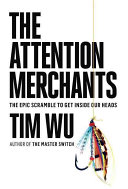2018 School Spending Survey Report
The Attention Merchants: The Epic Scramble To Get Inside Our Heads
Knopf. Oct. 2016. 416p. notes. index. ISBN 9780385352017. $28.95. BUS
COPY ISBN
VERDICT Part history and part social wake up call, this book is for everyone.
RELATED
ALREADY A SUBSCRIBER? LOG IN
We are currently offering this content for free. Sign up now to activate your personal profile, where you can save articles for future viewing




Comment Policy:
Comment should not be empty !!!